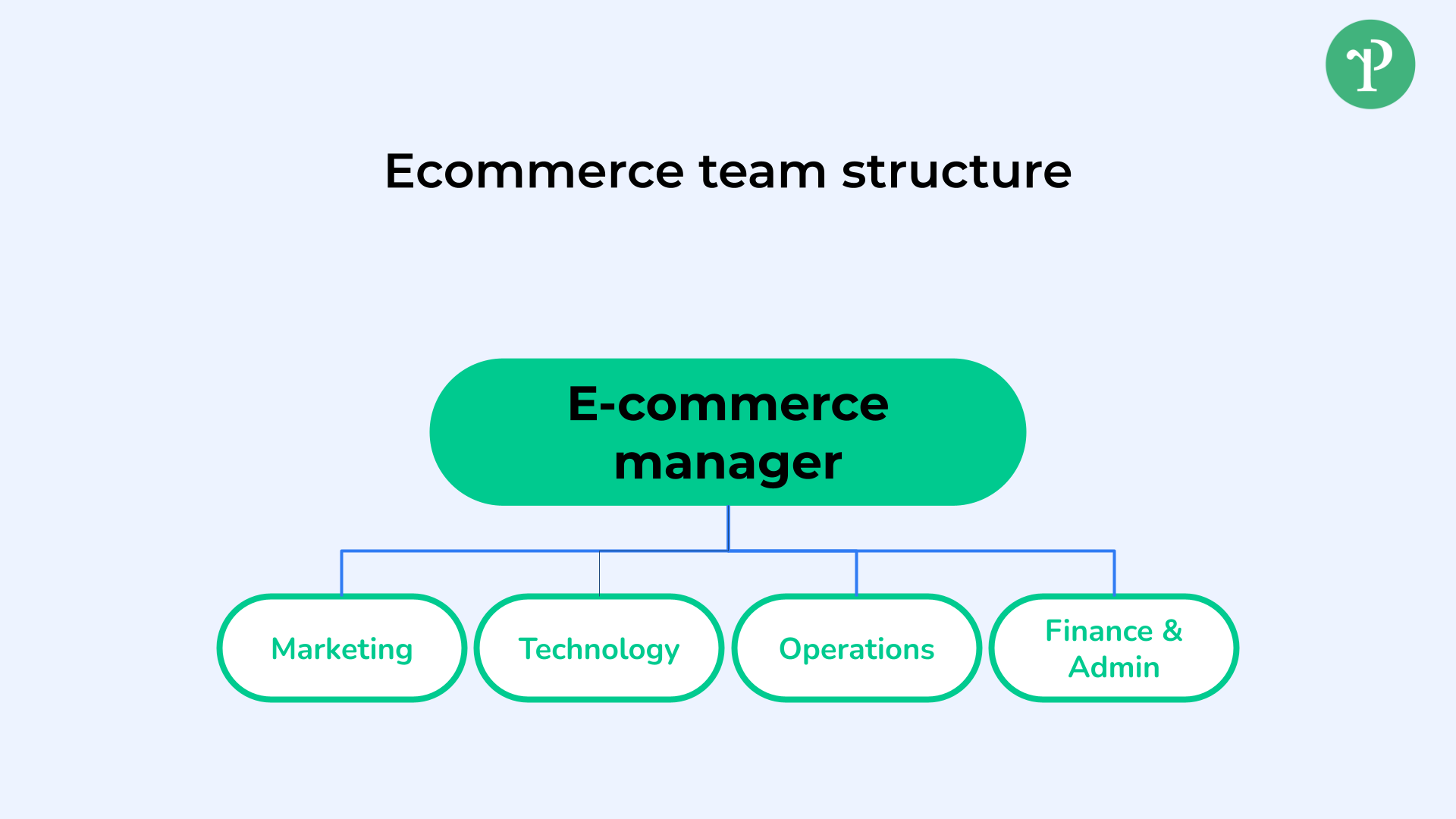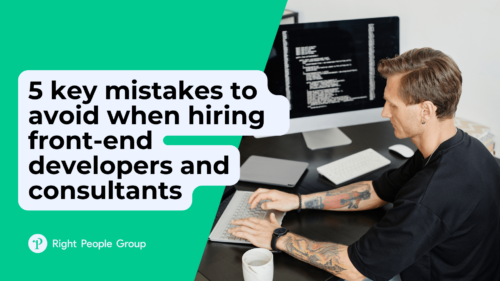When it comes to running a successful ecommerce business, it’s not just about having a great product or a flashy online store. The backbone of any ecommerce business is its team. The right ecommerce team structure can make or break your business. So let’s dive in and discuss the essential roles and responsibilities you’ll need to fill to create a profitable online team.
Understanding the big picture: The best ecommerce team structure

The structure of ecommerce teams can differ from business to business. But generally, you’ll find these key departments:
1. Business development and strategy: This team is usually headed by the ecommerce manager. They focus on the growth aspects and overall strategy.
2. Marketing team: This is your outreach powerhouse, the team that pulls people into your online store and keeps them engaged.
3. Tech team: They’re the backbone that keeps your online store running smoothly.
4. Operations and logistics: This department takes care of inventory, shipping, customer service, and the like.
5. Finance and administration: They handle the money side of things, from budgets to accounting.
Who does what? Roles in detail
Let’s dig a little deeper into what each role does and why they are critical for ecommerce businesses.
Business development and strategy

Ecommerce manager
Think of the ecommerce manager as the captain steering the ship. They’re responsible for setting the overall ecommerce strategy and usually work closely with both retail and online teams. They oversee the ecommerce department and focus on achieving outcomes for your most successful ecommerce clients and consumer marketing clients.
Main tasks
Strategy: Plan how to grow the business.
Teamwork: Coordinate between departments like marketing and tech.
Customer focus: Ensure a smooth shopping experience.
Data: Use numbers to make smart decisions.
Skills needed
Strategic thinking: Ability to develop and implement business plans.
Team leadership: Strong skills in managing diverse teams and departments.
Customer-centric mindset: Focus on enhancing user experience.
Data analytics: Proficiency in tools like Google Analytics for decision-making.
Ecommerce platform expertise: Knowledge of platforms like Shopify or Magento.
Marketing team

Let’s face it, you could have the best product in the world, but if no one knows about it, you’re not going to make sales. That’s where your marketing team comes in. They’re the ones who get the word out, draw people in, and keep them coming back for more. So, let’s take a closer look at the key players in a top-notch ecommerce marketing team.
Digital marketing manager
Think of your digital marketing manager as the general of your marketing army. They’re the ones who set the strategy and make sure everyone is working towards the same goals. They’re not just about getting new customers; they’re also focused on keeping the ones you already have.
Skills and capabilities
Expert in digital marketing channels, from SEO to PPC.
Strong analytical skills to measure campaign performance.
Experience in customer segmentation and targeting.
Social media marketing specialist
Social media isn’t just for sharing memes and vacation pics. It’s a powerful tool for building your brand and connecting with your audience. Your social media marketing specialist is the one who knows how to leverage platforms like Facebook, Instagram, and Twitter to your advantage.
Skills and capabilities
Creative thinker who can craft compelling social media campaigns.
Good at social listening to understand what the audience wants.
Experience with social media analytics tools like Hootsuite or Buffer.
Email marketing specialist
Some people think email is old school, but in the ecommerce world, it’s still a heavy hitter. Your email marketing specialist is the one who knows how to create emails that people actually want to open, read, and act on.
Skills and capabilities
Strong copywriting skills to craft compelling messages.
Experience with email marketing platforms like Mailchimp or SendinBlue.
A/B testing know-how to optimize email performance.
Content marketing strategist
Content is king, and your content marketing strategist wears the crown. They’re responsible for creating valuable, relevant content that not only attracts but also retains customers.
Skills and capabilities
Excellent writing and storytelling skills.
SEO knowledge to make sure the content ranks well on search engines.
Strategy planning to align content with business goals.
SEO specialist
If you want people to find you online, you need to rank well on search engines. That’s where the SEO specialist comes in. They make sure your website is optimized to appear in relevant search results.
Skills and capabilities
Deep understanding of search engine algorithms.
Experience with SEO tools like SEMrush or Ahrefs.
Strong analytical skills to measure SEO effectiveness.
Tech roles: The nuts and bolts of your ecommerce operation

When it comes to ecommerce, the tech team is the engine room. These are the people who ensure your online store is not just operational but optimized for performance, security, and growth. While I touched upon a couple of roles in the tech team earlier, it’s worth going into more detail given their critical importance.
Web developer
In the ecommerce team structure, the role of a web developer is multi-faceted, covering both front-end and back-end responsibilities.
On the front-end, they’re the architects of a user-friendly, intuitive website interface that elevates the customer experience. This is a key element in web development for any successful ecommerce store.
When it comes to back-end tasks, they are in charge of server-side functionalities, database management, and the application’s core logic.
Their expertise ensures that the ecommerce structure is robust enough to accommodate large-scale operations, including high levels of traffic and sizable transaction volumes.
Skills and capabilities
Languages: Proficient in HTML, CSS, and JavaScript.
Backend skills: PHP, Python, or Node.js are often essential.
Frameworks: Knowledge of frameworks like AngularJS or React.
CMS: Experience with ecommerce platforms like Shopify, Magento, or WooCommerce.
Ecommerce operations specialist
While the title may seem a bit general, the responsibilities are highly specific.
The ecommerce operations specialist looks into the daily operations of the ecommerce platform.
They work on implementing new features, ensuring GDPR compliance, and handling customer data in a secure manner.
Their role is critical in creating a unified and GDPR-compliant way for the business to operate.
They work closely with web developers and are often the go-between for the tech team and the business strategy team.
Skills and capabilities
Platform expertise: Must be well-versed in ecommerce platforms such as Magento, WooCommerce, or Shopify.
Data management: Should know SQL or other database management skills.
Compliance: Understanding of GDPR or other data protection regulations.
Data analyst
Data is the goldmine for ecommerce. A data analyst sifts through mountains of data to provide actionable insights. They track KPIs, analyze customer behavior, and help the marketing team understand what’s working and what’s not. They also work closely with the financial analyst to track and predict sales trends, making sure you make profitable decisions.
Skills and capabilities
Data analytics tools: Proficiency in tools like Google Analytics, Tableau, or Adobe Analytics.
SQL: Capability to write SQL queries to extract insights.
Data visualization: Skills in presenting data insights in an easily understandable manner.
Security specialist
In a world where cyber threats are increasingly sophisticated, having a dedicated security specialist is no longer optional, especially for large-scale ecommerce businesses. This role involves setting up firewalls, monitoring for suspicious activities, and working on data encryption. Their primary objective is to protect both customer and company data.
Skills and capabilities
Firewall management: Experience with firewall rules and monitoring.
Encryption: Knowledge of data encryption techniques.
Certifications: CISSP, CISM, or other security certifications can be beneficial.
DevOps engineer
The DevOps engineer works to streamline the development process, focusing on automating as many operational tasks as possible. They often introduce continuous integration and continuous delivery (CI/CD) pipelines to ensure faster and safer code deployments. This makes it easier for the tech team to roll out new features or make changes, saving time and reducing the risk of errors.
Skills and capabilities
CI/CD tools: Familiarity with Jenkins, Travis CI, or GitLab CI.
Containerization: Experience with Docker or Kubernetes.
Cloud services: Working knowledge of AWS, Azure, or Google Cloud.
QA tester
Quality assurance (QA) is critical in ecommerce. QA testers rigorously test the website for bugs, performance issues, and usability. They ensure that all elements of the ecommerce store, from shopping carts to payment gateways, work seamlessly. It’s a role that requires meticulous attention to detail and is crucial for maintaining a high level of customer satisfaction.
Skills and capabilities
Automation tools: Skills in Selenium, JUnit, or other test automation tools.
Scripting: Basic scripting skills in languages like Python or Ruby.
Agile methodology: Understanding of Agile or Scrum frameworks.
Mobile app developer
As more people shop through mobile devices, having a mobile app can give your ecommerce business a competitive edge. A mobile app developer specializes in creating and maintaining mobile applications for platforms like Android and iOS. They work on optimizing the mobile user experience and ensuring that the app integrates seamlessly with your ecommerce store.
Skills and capabilities
Native development: Experience with Swift for iOS and Kotlin for Android.
Cross-platform tools: Proficiency in tools like Flutter or React Native for cross-platform development.
APIs: Know-how in integrating APIs to fetch or send data to the mobile application.
Operations and logistics team: the engine room of your ecommerce business

You’ve got a great product and a killer marketing strategy, but who’s going to make sure that product actually gets into your customers’ hands?
That’s where the operations and logistics team comes in. They’re the unsung heroes who make sure everything runs like a well-oiled machine, from the moment a customer clicks “buy” to the moment the package arrives at their doorstep.
Operations manager
The operations manager is like the conductor of an orchestra, making sure all the different parts are working in harmony. They oversee everything from inventory management to customer service.
Skills and capabilities
Strong organizational skills to keep track of multiple processes.
Good at problem-solving, especially when it comes to operational challenges.
Familiarity with supply chain management.
Logistics coordinator
If the operations manager is the conductor, think of the logistics coordinator as the stage manager. They make sure all the products are in the right place at the right time, ready to be shipped out.
Skills and capabilities
Detail-oriented to ensure accurate shipping and delivery.
Experience with logistics software like Freightview or ShipStation.
Strong communication skills to coordinate with suppliers and shipping companies.
Inventory specialist
In consumer goods ecommerce businesses, you can’t sell what you don’t have. The inventory specialist makes sure you always know what’s in stock, what’s running low, and what needs to be reordered.
Skills and capabilities
Good with numbers and data analysis.
Experience with inventory management systems like Zoho Inventory or QuickBooks Commerce.
Quick decision-making skills to handle stock-related issues.
Customer service representative
Last but definitely not least, the customer service rep is the face of your company to any customer who has a question or issue. They’re the ones who can turn a one-time buyer into a loyal customer.
Skills and capabilities
Excellent communication and listening skills.
Patience and empathy to understand customer needs.
Familiarity with customer service software like Zendesk or Freshdesk.
Finance and administration: the unsung heroes of ecommerce

Let’s be honest, when you think of an ecommerce business, you’re probably not picturing spreadsheets and tax forms. But the truth is, a strong finance and administration team is what keeps the whole operation running smoothly. They’re the ones making sure you’re profitable, compliant with laws, and operationally efficient. So, let’s dive into the roles that make up this essential team.
Financial analyst
Imagine having someone who can tell you if you’re on the road to success or headed for a financial cliff. That’s your financial analyst. They look at all the numbers and trends to help the business make informed financial decisions.
Skills and capabilities
Knows their way around financial software like QuickBooks or SAP.
Aces in data analysis to provide actionable financial insights.
Has a knack for budget planning and management.
Accountant
Your accountant is the person who makes sure the financial t’s are crossed and i’s are dotted. They handle everything from bookkeeping and payroll to making sure your taxes are filed correctly.
Skills and capabilities
Proficient in accounting software like QuickBooks or Zoho Books.
Keeps up with the latest tax laws and regulations.
Pays close attention to detail, especially when preparing and auditing financial statements.
Administrative officer
Think of the administrative officer as the oil in your business machine. They handle the day-to-day admin tasks that keep your office running smoothly, so everyone else can focus on their jobs.
Skills and capabilities
Great at juggling multiple tasks at once.
Communicates clearly and effectively.
Understands the basics of HR practices and policies.
Compliance officer
In ecommerce, you can’t afford to ignore the rules. Your compliance officer makes sure you’re playing by the book, from internal policies to external regulations.
Skills and capabilities
Well-versed in relevant laws and regulations.
Good at identifying and evaluating compliance risks.
Keeps meticulous records to prove you’re doing everything above board.
In-house team vs outsourcing
When building your team, you have two primary options: create an in-house team or hire entire ecommerce teams from an ecommerce development company.
An in-house team can be more in sync with your company culture, but outsourced teams can bring in specialized skills you might not have internally.
Best practices for creating a profitable ecommerce team
1. Collaboration is key: Use platforms that allow your team members to collaborate. Tools like Onsiter VMS allow your team to make collaborative decisions for better projects.
2. Transparency matters: Have a system where you can track contractor history, availability, timesheets, and expenses. This helps you make profitable decisions.
3. Embrace automation: Automate tasks where possible to free up time for more important work. Use digital contracts, automated invoicing, and other features to streamline operations.
Wrapping it up
Putting together a profitable ecommerce team is more than just a bunch of hires. It’s a carefully planned structure of roles and responsibilities that collaborate to make your online business successful. From tech to marketing to operations, each role has a specific function that contributes to the overall success of the enterprise. So when you’re setting up or scaling your ecommerce business, make sure you’ve got the right team behind you.












